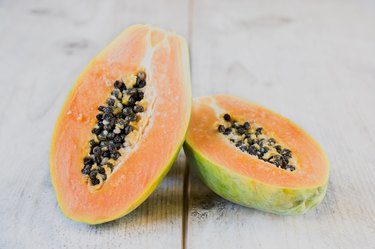
Papaya is a nutritious fruit grown in tropical regions. Papaya is rich in antioxidants and a good source of various vitamins and minerals. Papaya also contains a proteolytic enzyme called papain, which accelerates the digestion or breakdown of protein into amino acids. Children, like adults, can experience poor digestion, celiac disease and other conditions that can be helped by papain. However, if your child has cystic fibrosis, you should be very cautious about giving him papaya or papain supplements. Consult your doctor before considering papain supplements.
Papaya
Video of the Day
Papaya is a slightly sweet fruit that has a unique, musky scent. Papayas are high in antioxidants, such as carotenoids and flavonoids, and good sources of vitamins A, B-9, C, E and K, as well as magnesium, potassium and insoluble fiber, according to the "American Dietetic Association Complete Food and Nutrition Guide." Papaya, much like pineapple, contains natural enzymes that help digest protein. Papain is the most predominant enzyme in papaya. Indigenous people who commonly consume papaya usually do so after protein-rich meals because they know that it promotes efficient digestion. Protein digestion is needed to yield amino acids, but high stomach acidity and release of pancreatic enzymes are required. If you or your children do not produce enough acid or pancreatic enzymes, protein metabolism is severely hampered.
Video of the Day
Uses of Papain
Papain is commonly regarded as a digestive aid for those who have trouble digesting protein, but it is also useful for heartburn, constipation, diarrhea, stimulating appetite, preventing ulcers, pain relief and accelerating the healing of minor injuries and bruises, according to the "Principles and Practice of Phytotherapy: Modern Herbal Medicine." As such, papaya juice or papain extract can be consumed internally or applied externally. If your child has celiac disease, papain may be useful because it breaks down wheat gluten, a major contributing factor in the condition. However, the purported benefits of papain have not been verified by scientific studies on people.
Papain Content
As a supplement, papain is extracted from the milky white latex of unripe papaya fruit. Unripe papaya is a much higher source of papain than ripened fruit. Although Americans predominantly eat the ripened fruit, green papaya is preferred in Southeast Asia and many other tropical countries. Papain is available alone in capsular form, combined with other plant enzymes such as bromelain or in the form of creams for external use. Dosages for children are generally no more than half of adult dosages, so read the labels carefully. To test for allergic reactions, give your children fresh, ripe papaya juice and see how they react before considering supplemental papain.
Caution
If your child has cystic fibrosis disease, a serious condition called fibrosing colonopathy could develop if large amounts of pancreatic enzymes, including papain, are consumed, according to "Harrison's Principles of Internal Medicine." Fibrosing colonopathy involves damage to the large intestine, so consult your primary care physician if your child has cystic fibrosis. Further, children with severe malabsorption disorders or those on blood-thinning medication should avoid proteolytic enzymes as well. Check with your doctor before giving supplements to your child, especially if he has health problems.